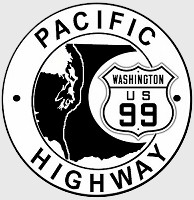
The Historic Pacific Highway
in Washington
Hudson's Bay Company Defended

The Historic Pacific Highway
in Washington
Hudson's Bay Company Defended
Hudson's Bay Company Defended
Part VIII
By Edward Huggins
The Sunday Oregonian
August 26, 1900
How often have I heard the Hudson's Bay Company abused and charged with doing things that would be almost impossible
for them to do, as its officers were gentlemen, and it would be out of all reason to think them guilty of the
offenses charged against them. Why, during the Indian war of 1855-'56 the company
at Nisqually was publicly charged with having supplied the hostile Indians with
arms and ammunition with which to massacre helpless white families.
Instead of that, the company's officers at Fort Nisqually did all they could to prevent the Indians from killing defenseless settlers, and I know that in many instances they prevented the Indians from doing many awful things. I have letters in my possession which conclusively prove that the company's officers were anxious, let alone willing, to aid and assist the used-up and almost starving emigrants.
The first American settlers came to the Sound in 1845 or '46. Mike Simmons, who was the first Indian agent appointed by the Government, settled at Tumwater; Edmund Sylvester, who took as a donation claim the townsite of Olympia; James MacAllister, killed by the Indians in 1855; William Packwood, George Shazer, who died in Olympia about November, 1899; Sydney Ford, James Borst, Jessie Ferguson, Antoine Rabbeson, Frank Shaw, now Colonel Shaw, of Vancouver; L. A. Smith, F. W. P. Tyrell and George Waunch were a few others. Most all of these men were farmers, and Shaw is the only one now alive, if I am not mistaken.
These people, or nearly all of them, were poor and depended on labor for subsistence. The companies alone were in a position to help them. The Hudson's Bay Company did, by trading shingles from them for provisions and clothing. There was hardly any market for the shingles thus obtained, and the quantity on hand became very great, and I recollect that when I came here, about 50 years ago, there was a great mountain of them piled in an enclosure at the end of the company's store, at the landing.
Dr. Tolmie wrote to the board, detailing the situation, and Governor James Douglas (a kinder-hearted man never lived), replied; "What can we do, doctor? We can't see these poor people suffer. If we continue to purchase their shingles and give them a fair price for them, I am sure we shall ultimately be able to dispose of them without suffering much, if any, loss."
And sure enough, it turned out so, for in 1848-49 the California gold mines were discovered and hard times on Puget Sound were a thing of the past Shingles were in demand at a good price. Ships came to the Sound seeking cargoes of piles for wharf building in San Francisco, and pile timber, at the ship's side, would fetch from 20 to 30 cents a running foot. Lumber, what little there was for sale, was worth $60 to $80 & thousand.
As late as 1853-'54 the lumber in the house in which I am writing this cost $30 to $40 a thousand feet, while labor procuring piles for ships' cargoes commanded $5 a day. Indians had lots of money then, obtained for labor loading ships with timber. The store at Fort Nisqually was the only place the Indians could trade, and they would come up some times, Skagits, Clallams Snohomish, Duwamish and Snoqualmies, in bands of from 20 to 50, and trade largely.
I have taken in one day from a party of these Indians as much as $300 in gold coin. This state of things did not last many years, and prices fell considerably. Farmers could always obtain a fair price for their produce, until the railroad was finished between Portland and Tacoma. This gave the farmers east of the mountains, and Oregon, an opportunity to rush in live-stock and produce, all the year round, thus taking from the farmer residing west of the mountains the benefit he derived from the difficulty of getting live and dead stock, also produce, into the Sound country, at all seasons of the year. But then I suppose, this is all the better for the non-producer and consumer.